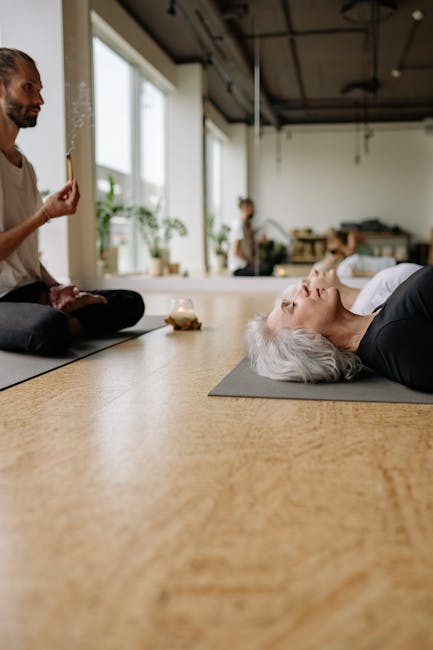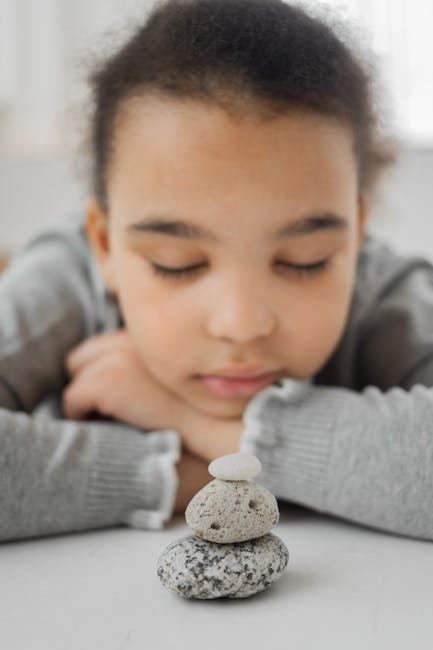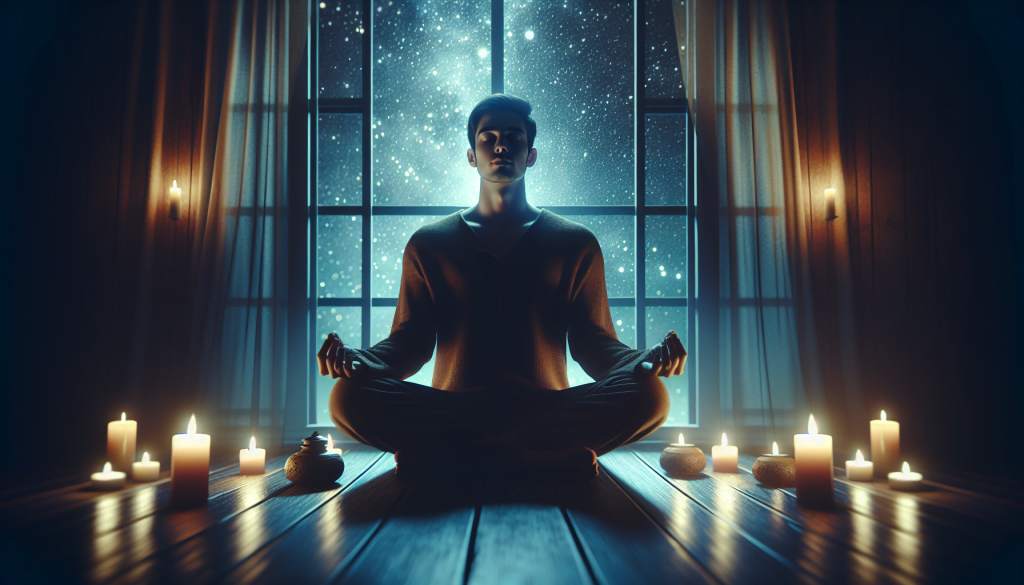If you’re one of the many people who toss and turn at night, unable to find the peaceful slumber you crave, meditation might just be the solution you’ve been searching for. This blog post will explore various meditation techniques that can help insomnia sufferers achieve better sleep. So, why should you keep reading? Because sleep is not just a luxury, it’s a necessity for your overall health and well-being. And if you’re struggling with insomnia, these meditation techniques could be the key to unlocking the restful sleep you need.
Key Takeaways
- Meditation can help improve sleep quality and reduce insomnia.
- Various meditation techniques, such as mindfulness meditation, guided meditation, and body scan meditation, can be effective for better sleep.
- Incorporating relaxation techniques and establishing healthy sleep habits can enhance the benefits of meditation.
- Optimizing your sleep environment and integrating meditation into your bedtime routine can further improve sleep quality.
- Regular meditation can lead to long-term improvements in sleep quality and reductions in stress and anxiety levels.
Introduction to Meditation and Sleep
Overview of Insomnia
Insomnia is a common sleep disorder that can make it hard to fall asleep, stay asleep, or cause you to wake up too early and not be able to get back to sleep. It can sap not only your energy level and mood but also your health, work performance, and quality of life (source).
Benefits of Meditation for Sleep
Meditation can be a powerful tool for battling insomnia and improving sleep. It helps to calm the mind and body by reducing stress, anxiety, and tension, which are often the root causes of insomnia. Regular meditation can also help to regulate sleep patterns and improve sleep quality over time.

Meditation Techniques for Better Sleep
Mindfulness Meditation
Practicing present-moment awareness
Mindfulness meditation involves focusing on your breath and bringing your mind’s attention to the present without drifting into concerns about the past or future. It helps you break the train of your everyday thoughts to evoke the relaxation response, using whatever sensation or perceptions you have as your anchor.
Techniques for beginners
If you’re new to mindfulness meditation, start with just a few minutes each day. Sit comfortably, close your eyes, and focus on your breath. When your mind wanders, gently bring it back to your breath. With practice, you’ll be able to meditate for longer periods and harness the power of mindfulness to improve your sleep.
Guided Meditation
Using guided imagery to relax
Guided meditation involves listening to a recorded voice that guides you through a series of relaxation techniques and imagery to help you relax and sleep. This can be particularly helpful for those who struggle with ‘turning off’ their thoughts at night.
Resources for finding guided sessions
There are many resources available online for guided meditations, including apps, podcasts, and websites. You can find guided meditations specifically designed for sleep, which use techniques such as progressive relaxation, soothing music, and sleep-inducing imagery to help you relax and drift off to sleep. Check out our post on meditation for better sleep for more information.
Body Scan Meditation
Progressive relaxation of each body part
Body scan meditation involves focusing on different parts of the body in turn, starting from the toes and working your way up to the head. As you focus on each part, you consciously relax the muscles, releasing tension and promoting relaxation and sleep.
How to perform a body scan before bed
To perform a body scan before bed, lie down comfortably and start by focusing on your toes. Gradually move your attention up your body, noticing any tension and consciously relaxing each part. By the time you reach your head, you should feel more relaxed and ready for sleep.

Relaxation Techniques to Enhance Meditation
Deep Breathing Exercises
Techniques like the 4-7-8 breathing method
Deep breathing exercises can help to calm the mind and body, preparing you for sleep. One popular technique is the 4-7-8 method, where you inhale for 4 seconds, hold the breath for 7 seconds, and exhale for 8 seconds. This technique can help to reduce anxiety and promote relaxation and sleep.
Best practices for bedtime breathing routines
For best results, incorporate deep breathing exercises into your bedtime routine. Practice them in a quiet, comfortable space where you won’t be disturbed. Start with just a few minutes each night and gradually increase the time as you become more comfortable with the practice.
Progressive Muscle Relaxation
Step-by-step guide
Progressive muscle relaxation involves tensing and then releasing each muscle group in your body, starting from your toes and working your way up to your head. This can help to release physical tension and promote relaxation and sleep.
Tips for effective practice
For best results, practice progressive muscle relaxation in a quiet, comfortable space. Tense each muscle group for about 5 seconds and then relax for 30 seconds before moving on to the next group. Remember to breathe deeply and evenly throughout the exercise.

Establishing Healthy Habits Around Sleep
Creating a Consistent Sleep Schedule
Importance of regularity
Maintaining a consistent sleep schedule can help to regulate your body’s internal clock and improve sleep quality. Try to go to bed and wake up at the same time every day, even on weekends.
Tips for maintaining consistency
To maintain a consistent sleep schedule, establish a regular bedtime routine that signals to your body that it’s time to sleep. This could include activities such as reading, taking a warm bath, or practicing your meditation and relaxation techniques.
Diet and Exercise
Foods and drinks to avoid before bedtime
Certain foods and drinks can interfere with sleep, including caffeine, alcohol, and heavy or spicy meals. Try to avoid these for at least a few hours before bedtime to improve sleep quality.
Recommended types of evening exercises
Regular exercise can help to regulate sleep patterns and improve sleep quality. However, it’s best to avoid vigorous exercise close to bedtime as it can interfere with sleep. Instead, opt for gentle exercises such as yoga or stretching in the evening.

Optimizing the Sleep Environment
Conditions for an Ideal Bedroom
Achieving the right darkness and quiet
Your bedroom should be dark, quiet, and cool for optimal sleep. Consider using earplugs, an eye mask, or a white noise machine if necessary. You can also use blackout curtains or shades to block out light.
Adjusting room temperature
The optimal room temperature for sleep is around 65 degrees Fahrenheit (18 degrees Celsius), but it can vary from person to person. Experiment with different temperatures to find what works best for you.
Choosing the Right Mattress and Pillows
Factors to consider for comfort
Your mattress and pillows can significantly impact your sleep quality. They should provide adequate support and comfort for your body type and sleep position. Consider factors such as firmness, material, and size when choosing your mattress and pillows.
Recommendations for different sleep styles
Different sleep positions require different types of support. For example, side sleepers may need a firmer pillow to support their neck and head, while back sleepers may benefit from a softer pillow. Check out our post on hypnosis for overcoming insomnia and promoting deep sleep for more tips on creating an optimal sleep environment.

Integrating Meditation into Bedtime Routines
Timing and Duration of Meditation
Optimal times to meditate for sleep
The best time to meditate for sleep is during your bedtime routine, about an hour before you plan to sleep. This can help to calm your mind and prepare your body for sleep.
Recommended duration for effectiveness
The duration of your meditation can vary based on your personal preference and schedule. However, even just a few minutes of meditation can be beneficial. Start with a short session and gradually increase the duration as you become more comfortable with the practice.
Combining Meditation with Other Relaxation Techniques
Sequence of relaxation activities
You can combine meditation with other relaxation techniques for a more comprehensive bedtime routine. For example, you might start with some gentle yoga or stretching, followed by deep breathing exercises, and then finish with your meditation practice.
Personalizing your routine for maximum benefit
The most effective bedtime routine is one that you can stick to consistently. Experiment with different activities and sequences to find what works best for you. Remember, the goal is to create a routine that relaxes and prepares you for sleep.
Long-Term Benefits of Meditation for Insomnia Sufferers
Improvements in Sleep Quality
Regular meditation can lead to significant improvements in sleep quality. It can help you fall asleep faster, stay asleep longer, and achieve deeper, more restful sleep. Over time, this can lead to improved energy levels, mood, and overall health and well-being.
Reduction in Stress and Anxiety Levels
Meditation is also a powerful tool for reducing stress and anxiety, which are often major contributors to insomnia. By helping to calm the mind and relax the body, meditation can promote a sense of peace and tranquility that makes it easier to fall asleep and stay asleep.

Conclusion
Recap of Key Techniques
In conclusion, meditation can be a powerful tool for improving sleep and combating insomnia. Techniques such as mindfulness meditation, guided meditation, and body scan meditation can help to calm the mind and relax the body, preparing you for sleep. Incorporating relaxation techniques and establishing healthy sleep habits can further enhance the benefits of meditation.
Encouragement to Experiment and Find What Works Best
Remember, everyone is different, and what works best for one person might not work as well for another. Don’t be afraid to experiment with different techniques and routines to find what works best for you. And remember, consistency is key. The more regularly you practice these techniques, the more effective they will be. So why not give meditation a try? It might just be the key to the restful sleep you’ve been dreaming of.
For more tips on incorporating meditation into your daily life, check out our post on incorporating meditation into daily life.
Soothing Your Nights: FAQ on Meditation Techniques for Better Sleep
What is the basic premise of using meditation to combat insomnia?
Meditation helps combat insomnia by promoting relaxation and reducing stress levels, which are often the root causes of sleep disturbances. By focusing the mind and reducing the stream of thoughts, meditation can decrease the body’s stress response, making it easier to fall asleep and stay asleep.
Are there specific types of meditation that are more effective for improving sleep?
Yes, mindfulness meditation, guided imagery, and body scan meditations are particularly effective for improving sleep. Mindfulness meditation helps in accepting and dealing with thoughts that may arise when trying to sleep. Guided imagery involves visualizing a calm and peaceful setting, which can help distract from stressors. Body scan meditation focuses on relaxing each part of the body sequentially, which can ease physical tension and promote sleep.
How long should I meditate before bed to help with insomnia?
The ideal duration can vary from person to person, but starting with 5 to 10 minutes of meditation before bed can be beneficial. Over time, you may find that increasing the duration to 20 minutes or longer is more effective for you. Consistency is key, so aim to incorporate it into your nightly routine.
Can meditation replace sleep medications for insomnia?
While meditation can be an effective tool for improving sleep and may reduce the need for sleep medications for some individuals, it should not be seen as a direct replacement without consulting a healthcare provider. Each case of insomnia is unique, and a comprehensive approach that may include medication, lifestyle changes, and meditation is often the most effective.
How quickly can I expect to see improvements in my sleep with meditation?
Improvements in sleep can vary widely among individuals. Some may notice benefits within a few days, while others might take several weeks to observe changes. Consistency is crucial, as the benefits of meditation often accumulate over time.
Is it normal to fall asleep during meditation for insomnia?
Falling asleep during meditation is a common occurrence, especially for individuals struggling with insomnia. If the goal of meditation is to fall asleep, then falling asleep during the practice can be seen as a sign of its effectiveness. However, if the aim is to stay awake and meditate, it might help to practice in a seated position rather than lying down.
Can meditation have negative effects on sleep?
For most people, meditation has a positive impact on sleep. However, in rare cases, some individuals might experience increased anxiety or hyperawareness of thoughts during meditation, which could temporarily disrupt sleep. Adjusting the meditation technique or consulting with a meditation instructor can help mitigate these effects.
Are there any tools or apps that can help with practicing meditation for sleep?
Yes, there are numerous apps and tools designed to assist with meditation practices for sleep. Apps like Headspace, Calm, and Insight Timer offer guided meditations specifically aimed at promoting sleep. These resources can provide structure and guidance for beginners or those struggling to maintain a consistent practice.



